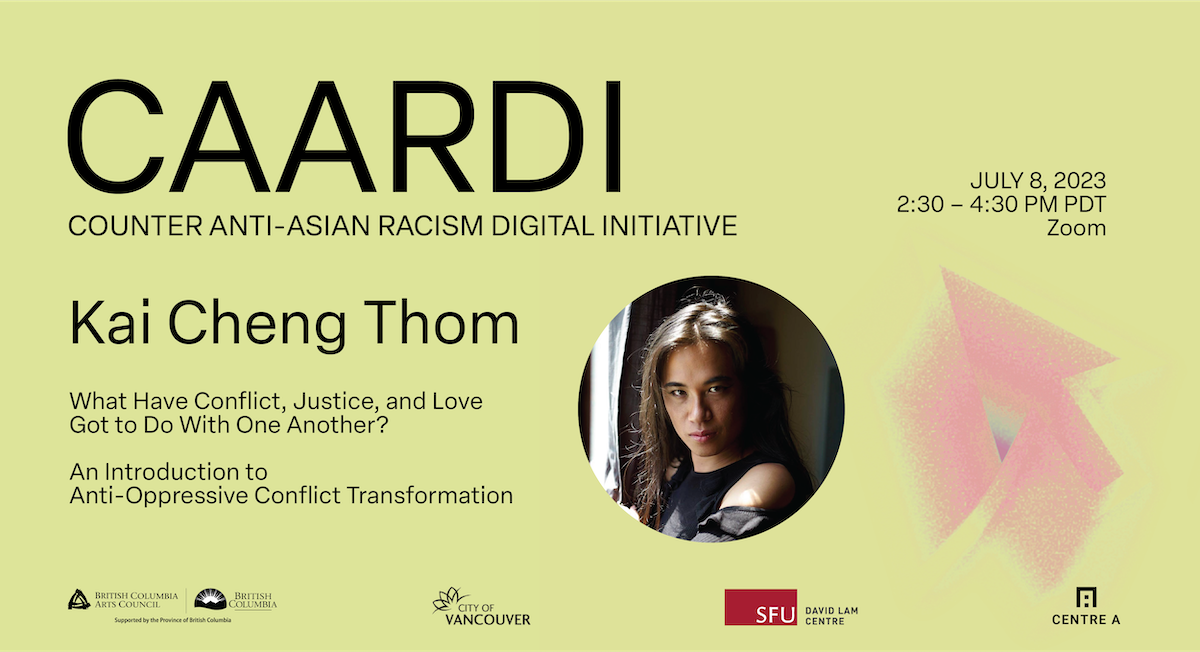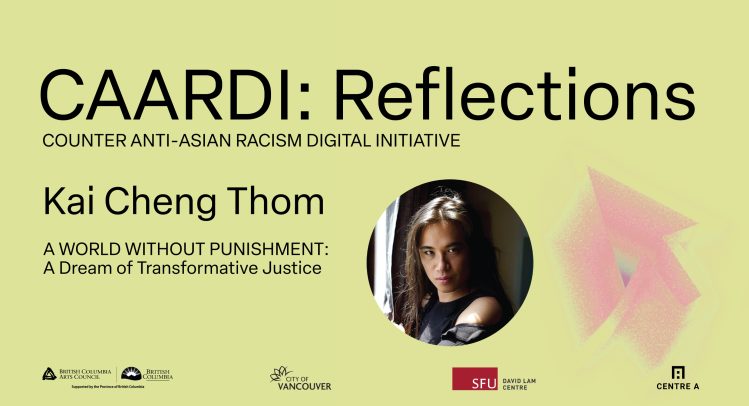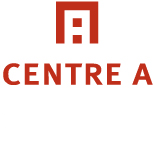Vancouver International Centre for Contemporary Asian Art

Kai Cheng Thom: What Have Conflict, Justice, and Love Got to Do With One Another? An Introduction to Anti-Oppressive Conflict Transformation
Saturday, July 8, 2023, 2:30 – 4:30 PM PDT
Centre A (Zoom)
–
Register HERE.
–
Join mediator, author, and healing justice practitioner Kai Cheng Thom for an inspiring and skills-based presentation on working with conflict in social movements. How can we understand conflict as an opportunity for relationship growth and transformation? How can community organizers and leaders respond to conflict in a courageous, loving way? And crucially, how do we de-escalate and respond to conflicts that threaten to destabilize our communities? Kai Cheng will present several key concepts for analyzing and working with conflict grounded in a trauma sensitive, abolition based approach.
Participants should come ready to explore conflict from various perspectives and be aware that conflict can be an emotionally triggering topic. Kai Cheng is not available during this workshop to provide extensive conflict coaching or emotional counseling. Please note that this is not a workshop focused on responding to intimate partner violence, but rather typical or normative conflicts that arise in group settings.

A WORLD WITHOUT PUNISHMENT: A Dream of Transformative Justice
Can you imagine a world without punishment?
Where violence, harm, wrongdoing, were met with our full powers of boundary-holding, containment, wisdom, and creative healing? Where people were held in their mistakes and capacity for destruction, their full humanity, with both unrelenting love and unrelenting justice? Where survivors and victims of violence were offered compassion, nurturing, and resources without having to prove and parade the extent of their suffering?
What would become possible? What would that feel like? How would it shift the ways that we carry our bodies and selves through this life? And what would we have to give up in order to get there?
We are in deep need of new social and emotional technologies for addressing conflict, abuse, and harm. Thousands of years of “eye for an eye” and “tough on crime” approaches have only served to traumatize us, further colonial and eugenicist legacies of genocide, and prop up a neoliberal capitalist system that thrives on the exploitation and disposal of human bodies (think: private prisons, forced labour, etc). The planet and global society are in crisis on many fronts. At every turn, we are confronted with yet more hypocrisy, perfidy, exploitation, dishonour from the people in power. Yet every revolutionary step seems to be just that – a turning of the wheel that sets corruption on top and crushes those below.
Accountability, true accountability, cannot be imposed from without. Transformative justice eludes us for as long as we rely upon the dehumanization of others in order to re-humanize ourselves in the wake of traumatic violence. A real transformative ethics must be drawn from deep integrity, interpersonal bonds, and a community of wisdom. A transformative justice system has as its aim not the disposal of transgressive bodies nor the punitive violation of violent individuals, but re-imagining of our ways of being: What would make a hurt person whole again (or whole enough)? What would make a bad person good again? How can a society that permits, perpetuates, and rewards violence become one that discourages, disincentivizes, and dismantles violence?
Many activist communities turn to speculative fiction for inspiration, and I think we can do so here as well. We do not always know how our socially transformative fantasies might play out in real life, but we can allow them to give us hope and shape our actions. In works of fantasy, the dishonoured prince, the fallen hero(ine), the wicked queen, and exiled villager are all profoundly resonant archetypes. In works that feature them, these characters often must go on a quest or journey to rediscover and restore their honour. This journey requires humility, great personal change, and acts of heroic goodness. When executed well, the creation of such narratives are not pat or easy (redemption may take an extremely long time, it may also never arrive); there may not be a ‘happy ending.’ But the existence of such narratives, to me, indicates a deep ancestral, instinctual knowledge within us about the possibilities that exist for restructuring the way we do justice. We can draw upon this model when we are creating alternative routes to addressing wrongdoing.
Who among us can honestly claim to have never done harm? Who among us is unworthy of redemption? What do we choose, here and now, at the end of our world? The path of punishment? Or the path of love?
–
Kai Cheng Thom, MSW, MSc, is a certified Somatic Sex Educator, Qualified Mediator, Clinical Hypnotherapist and Certified Professional Coach based in tkaronto/Toronto. She is also the author of five award-winning books in various genres. Kai Cheng’s work focuses on the intersection of social justice, pleasure activism, and transformative approaches to healing conflict. A noted speaker and practitioner of somatic wellness, healing, and group process facilitation, Kai Cheng supports individuals and groups who are seeking to repair relationships and make transformative change. She also teaches as Adjunct Faculty at the Institute for the Study of Somatic Sex Education.
Accessibility: The gallery is wheelchair and walker accessible. If you have specific accessibility needs, please contact us at (604) 683-8326 or [email protected].
Centre A is situated on the unceded territories of the Musqueam, Squamish, and Tsleil-Waututh peoples. We honour, respect, and give thanks to our hosts.






